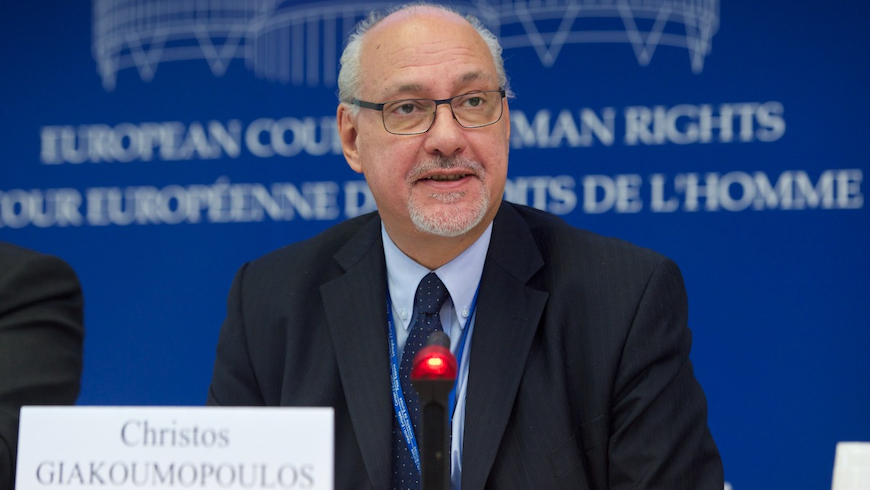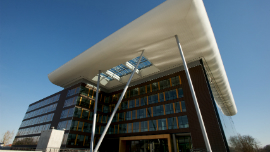Introductory Speech by Christos Giakoumopoulos
Saint Petersburg Legal Forum, “Human Rights under Quarantine”
10 April 2020, Strasbourg
Exellencies,
Ladies and Gentlemen,
I would like at the outset to thank the Russian authorities for the organization of this most topical discussion. I have great pleasure in moderating this session together with our standing interlocutor Vice Minister of Justice Mikhail Galperin.
It is also a great honour for me to be the co-moderator of this distinguished panel [and I welcome Ms Tatiana Moskalkova, Commissioner for Human Rights of the Russian Federation, Mr Rustam Badasyan, Minister of Justice of the Republic of Armenia, Mr Dmitryi Aristov, Chief Bailiff of the Russian Federation , Mr Alexander Kalishnikov, Chief of the Penitentiary Administration of the Russian Federation and my colleague, the Council of Europe Director of Information Society and Action against Crime, Jan Kleijssen.
We have so many legal matters to deal with together on a day-to day basis for the implementation of the European Convention on Human Rights and the European Court’s judgments, whose President we have all heard a minute ago.
But life has suddenly confronted us with more issues, and when I say “us” it is not only the whole Europe, including Russia, but indeed, the whole world.
You have perhaps heard that some European political leaders compared the current sanitary catastrophe with a war. And indeed, all humankind looks united against a single invisible enemy.
While the health professionals fight for lives, lawyers and economists are considering other dimensions of this crisis and start anticipating the world’s recovery in its aftermath.
This is where the Council of Europe comes into play.
As our Secretary General reminded at the plenary session, our organisation was created to rethink and rebuild Europe after a major disruption in its history, and then to maintain a lasting peace, cohesion and economic wealth by means of Pan-European cooperation.
Any crisis like the current one presents a risk of new disruption. The Council of Europe has neither troops, nor hospitals. But we have our unique legal mechanisms which remain effective. They protect all Europeans against the risk of disruption. And they will assist in the continent’s subsequent recovery after the crisis.
Indeed, European States cannot and will not neglect, let alone ignore the international cooperation in times of crisis or its aftermath. We will need to make full use of the international co-operation in the new realities.
In my introduction, I will first briefly recall how we serve our Member States now and then elaborate on how the new needs emerging from the crisis will change our agenda tomorrow.
- So, what are we doing as the crisis is still on its top?
As you may have noted, we sit in the middle of the Council of Europe’s main hall, which is unusually quiet. However, despite our buildings being almost empty, our core legal and judicial mechanisms remain fully operational.
This is one of the first and interesting lessons learned – while we cannot hold in situ meetings in Strasbourg, our legal and judicial mechanisms continue to serve the Member States and their 820 million citizens as the as they are expected to do, and this notwithstanding the quarantine. “The law shall continue”, as Mr Medvedev said earlier today.
I will mention only two brief examples:
- As late as yesterday the Strasbourg Court delivered an important decision. It recognized that the new compensation mechanism for inadequate detention conditions is an effective remedy. It is common ground that the detained persons, like other vulnerable persons, may suffer more than others during the sanitary crisis. The question of sanitary conditions in detention facilities is of utmost importance. The new domestic remedy recently introduced by Russia is a welcome response to the Court’s previous pilot judgment; and the Strasbourg Court has very quickly reacted and taken it into account. This interaction, which has not stopped at the time of crisis, will henceforth allow Russian courts to remedy possible violations of the Convention at the national level. In addition the European Committee for the Prevention of Torture (CPT) issued a set of principles relating to the treatment of persons deprived of their liberty in the context of the pandemic. Their implementation will facilitate dealing with this issue in prisons and other places of detention, for the benefit of both those who are detained and for the staff working in these institutions.
- A second example, the Committee of the Parties to the Council of Europe MEDICRIME Convention, also known as the Moscow Convention, issued two days ago its Advice on how to tackle the risks of falsified medical products in the context of COVID-19; The high quality of medicines is primordial for curbing the crisis. The Moscow MEDICRIME Convention and the Council of Europe Pharmacopea are the leading tools that have rapidly been deployed in response to the crisis.
There are many more examples of activities the Council of Europe put in motion rapidly since some weeks.
Our Secretary General has circulated an information document earlier this week: a “Toolkit” which recall Europe’s legal and political fundamentals the virus must not destroy. The Toolkit is intended to assist our Member States in finding the adequate legal and political responses to overcome the crisis.
- This brings me to my next point: How the crisis will change our future agenda?
You have heard our Secretary General mentioning this morning several topics which require our joint efforts and will be in the center of our agenda in the months and years to come.
One global conclusion is that the protection of the cohesion f our societies and, therefore, of social and economic rights must become our major concern. The next monitoring cycle of the European Social Charter will be dedicated to the right to health (Article 11), while the Bioethics Committee will focus its attention on the right to equitable access to health care enshrined in the Convention on Human Rights and Biomedicine, known as the Oviedo Convention (Article 3). I have already mentioned the initiatives to guarantee the high quality of medicines. Likewise, we feel the need of more solidarity and therefore of more effective common standards for protection of vulnerable people and the world of labour, whose exposure to the economic crisis will be particularly severe.
Another overall conclusion which emerges from this crisis is that public health must become a subject of genuine democratic debate. Of course, this involves the protection and promotion of political freedoms, but they are not the only condition for public scrutiny. An informed public debate also requires access to accurate information and documents, including official documents.
How much do we know about the crisis and related policy-making? How far the crisis will change the world economy? What is the social impact of confinement? What mitigating measures are envisaged?
The Council of Europe has a very important convention on access to official documents, also known as the Tromsø Convention, which is likely to enter into force later this year. nterestingly, it takes it origin in the problems surrounding the public debate that followed the Chernobyl disaster. The number of issues that affect each of us is even greater today than it was then. I trust that the forthcoming entry into force of the Tromsø Convention will be a further contribution by the Council of Europe to the protection of democratic and responsible governance.
I will conclude my introductory statement by recalling the Council of Europe main methods which we continue to employ while we address the acute issues I have just recalled: Dialogue and cooperation, through our unique legal mechanisms.
It is these Pan-European legal mechanisms that bring to life our values – Human Rights, Democracy and Rule of Law - which would otherwise be empty words. All our Member States contribute to such a structured cooperation as much as they benefit therefrom. The current crisis has once again revealed this added value and it will be even more so when time will come to recover after the crisis will be over, hopefully, very soon!




